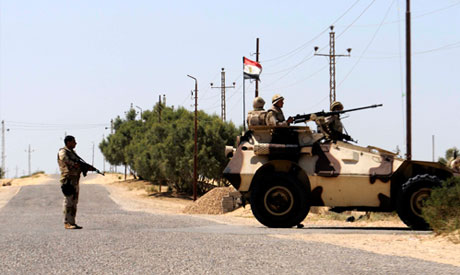
Soldiers in a military vehicle are seen proceeding towards al-Jura district in El-Arish city from Sheikh Zuwaid, around 350 km (217 miles) northeast of Cairo May 21, 2013 (Photo: Reuters)
Egyptian troops and police mistakenly fired on a Bedouin funeral in the Sinai Peninsula on Tuesday, security officials said, in the opening salvo of a sweep searching for security personnel kidnapped by suspected militants.
The incident illustrated the hazards of the military operations prompted by the kidnapping last week. A heavy handed attempt to free the captives risks bringing a backlash in Sinai, where resentments among the local population against past security crackdowns have fueled the rise of militancy in the volatile peninsula bordering Gaza and Israel.
Faced with anger among the public and within the security forces over the kidnappings, President Mohammed Morsi has said all options are on the table for securing the release of the seven captives and that the presidency is not negotiating with the kidnappers.
Calls for a tough response have been fueled by a video released this week on YouTube showing the captives blindfolded and pleading for Morsi and his defense minister to meet the kidnappers' demands for the release of scores of prisoners from the Sinai, including convicted militants. The captives include six members of the security forces and a military border guard.
But multiple officials have said mediators have been in contact with the kidnappers exploring possibilities for their release. Islamist allies of Morsi — who have connections to militants in the Sinai — have urged a negotiated solution.
Since Monday, military and police reinforcements backed by armored vehicles and helicopters have moved into northern Sinai in a show of strength, deploying heavily around the provincial capital, el-Arish. A military official in Cairo said troops are conducting reconnaissance and search operations, but wouldn't say if this is start of operation to rescue captives. The official spoke on condition of anonymity because he was not authorized to talk about the operations.
Tuesday's incident came while police and military troops backed by helicopters swept through several villages near the border with Israel where officials say they suspect the captives are held.
The forces encountered a funeral convoy of eight pickup trucks and when the vehicles refused orders to stop, the troops thought they were gunmen and opened fire, security officials said.
Some in convoy fired back — most Bedouin are armed — prompting clashes, until the mourners fled the scene, leaving behind the body of the man they had intended to bury. The troops thought the man had been killed in the fight, until local tribal leaders explained to security commanders that the convoy was a funeral for a man who had drowned, the officials said.
A senior military officer then apologized for the shooting, said the security officials, speaking on condition of anonymity because they were not authorized to talk about the incident.
Morsi has been consulting with his security team, government officials, political and religious leaders how to resolve the crisis, which highlighted the complex security situation in Sinai.
Sinai's population of Bedouin and local families has long complained of discrimination by authorities and is bitter over repeated security crackdowns during the rule of ousted autocrat Hosni Mubarak. During the 2000s, Islamic militants staged attacks on tourist resorts in the peninsula, prompting a vast sweep of arrests.
Crackdowns have seen frequent reports of torture of Sinai's detainees, and some detainees have been held for years without conclusive trials. Repeated promises to families and tribes of detainees to resolve their cases have gone unfulfilled, fueling resentments.
Extremist groups only increased their activity in Sinai amid the breakdown in law and order since Mubarak's 2011 ouster, with increasing attacks into neighboring Israel.
Morsi faced his first Sinai challenge in August last year, just over a month after taking office, when militants carried out the most brazen attack ever on military troops, killing 16 Egyptian soldiers along the border with Gaza and Israel. Morsi at the time vowed to restore stability, launching a brief military operation that resulted in the closures of some smuggling tunnels between Sinai and Gaza and the arrest of the man believed to be at the heart of the current kidnapping, Ahmed Abu Shita.
Abu Shita was convicted to death in September for involvement in a major attack on a northern Sinai police station in 2011 that left three policemen dead. Thirteen others, including eight in absentia, were also given death sentences in the case.
Those behind the current kidnapping are demanding the release of Abu Shita, along with other Sinai prisoners.
Such strong security buildup is uncommon in Sinai. The 1979 peace deal between Egypt and Israel restored Sinai to Egypt after it was captured by Israel in the 1967 war. But it restricted numbers of troops and types of weapons Egypt could station there. Nothing more than a light weapon was allowed in most of the peninsula, and only police — not soldiers — were allowed in the zone directly on the border.
But for the past years, with rising lawlessness in Sinai and increased smuggling activities with Gaza, Israel bent some of the rules.
Major Egyptian military operations there would require Israeli consent under the terms of the peace agreement. Israeli officials declined to comment Tuesday, but in the past have said that security cooperation has remained strong since the new Islamist government took office. The official silence could be a signal of Israeli consent.
Short link: